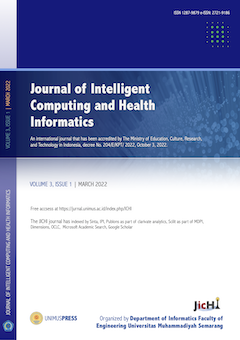Policy Statement
These policies have been triggered by the rise of generative AI and AI-assisted technologies, which are expected to be increasingly used by content creators. This policy is adopted from the COPE AI Guidelines. It aims to provide greater transparency and guidance to authors, reviewers, editors, readers, and contributors. The Journal of Intelligent Computing and Health Informatics (JICHI) will monitor developments in this area and will adjust or refine its policies as appropriate.
For Authors
The use of generative AI and AI-assisted technologies in scientific writing
This policy applies solely to the writing process, not to the use of AI tools for data analysis or research methodology.
When authors use generative AI or AI-assisted technologies in writing, such tools must only be used to improve the readability and language quality of the manuscript. These technologies should be applied under human oversight, and the resulting output must be carefully reviewed and edited by the authors, as AI-generated content can sound authoritative but may be inaccurate, incomplete, or biased. Ultimately, the authors are fully responsible and accountable for the content of their work.
Authors must clearly disclose the use of AI or AI-assisted tools in a dedicated section of the manuscript, prior to the references. This disclosure will appear in the final published version. Declaring such usage promotes transparency and fosters trust among authors, readers, reviewers, editors, and contributors, while also supporting compliance with the terms of use of the technologies applied.
Generative AI tools must not be listed as authors or co-authors, nor should they be cited as authors. Authorship implies human responsibility and accountability, including approval of the final version of the manuscript and acceptance of responsibility for the integrity of the work. Authors must ensure that their submission is original, that all listed authors meet the criteria for authorship, and that the work does not infringe any third-party rights. Authors are advised to review the JICHI Ethics in Publishing policy before submitting their manuscript.
The use of generative AI and AI-assisted tools in figures, images, and artwork
JICHI does not allow the use of generative AI or AI-assisted tools to create, alter, or manipulate images in submitted manuscripts. This includes adding, removing, obscuring, or moving specific image features. Basic adjustments to brightness, contrast, or color balance are acceptable only if they do not obscure or eliminate any original data.
Exceptions are permitted if the AI-based tool is an integral part of the research methodology—for example, in AI-assisted biomedical image analysis or intelligent health diagnostics. In such cases, authors must describe the use of AI tools reproducibly in the methods section. This includes specifying the name, version, extension, and provider of the tool or model, along with a clear explanation of its role in image generation or modification. Authors may also be asked to provide unprocessed images or raw composite data upon editorial request.
Use of AI tools to generate graphical abstracts or visualizations is not permitted. However, AI-generated cover art may be allowed under exceptional circumstances, with prior permission from the editor and publisher, appropriate rights clearance, and proper attribution.
For Reviewers
The use of generative AI and AI-assisted technologies in the peer review process
Manuscripts received for peer review must be treated as confidential documents. Reviewers must not upload the manuscript, in whole or in part, to any generative AI platform, as this may violate the confidentiality, copyright, or data privacy rights of the authors.
The same confidentiality applies to the peer review report. Reviewers must not use generative AI tools to write or edit their review reports, even if the intention is to improve language or style.
Peer review is central to the scientific process, and JICHI upholds the highest standards of integrity in this area. The critical thinking, judgment, and accountability required in peer review are responsibilities that only humans can fulfill. Generative AI is not capable of reliably performing scientific critique and may introduce misleading or biased conclusions. Therefore, reviewers are fully responsible for the originality and accuracy of their reports.
The Journal of Intelligent Computing and Health Informatics (JICHI)’s AI Author Policy permits the use of generative AI and AI-assisted technologies only for improving language and readability, and only with proper disclosure as described in the JICHI Guide for Authors. Reviewers may find the AI disclosure in a separate section near the end of the manuscript, before the references.
For Editors
The use of generative AI and AI-assisted technologies in the editorial process
Manuscripts submitted to JICHI must be handled as confidential documents. Editors must not upload any part of a submission into a generative AI platform, as this could compromise author privacy, data protection, or intellectual property rights.
This confidentiality also extends to editorial communications such as decision letters, reviewer comments, and correspondence with authors. Editors must not use generative AI tools to draft or revise such documents.
Managing the editorial process requires human expertise and accountability. The use of generative AI to assist in manuscript evaluation or decision-making is strictly prohibited. These responsibilities involve nuanced judgment and contextual understanding that AI tools are not capable of delivering. The editor remains fully responsible for the editorial process, the final decision, and its communication.
As outlined in JICHI’s AI Author Policy, authors are allowed to use generative AI and AI-assisted tools to improve language and readability, provided the use is disclosed transparently. Editors can verify such disclosures in the final section of the manuscript. If an editor suspects a breach of this policy—by authors or reviewers—they should report the case to the journal’s publisher or editorial board for further investigation.








